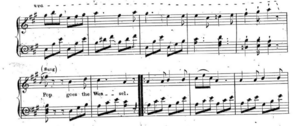Pop Goes the Weasel facts for kids
Quick facts for kids "Pop! Goes the Weasel" |
|
|---|---|

Sheet music
|
|
| Nursery rhyme | |
| Published | 1852 |
"Pop! Goes the Weasel" is a super famous English nursery rhyme and a fun singing game. You might know it best from Jack-in-the-box toys, where the music plays just before the toy pops out! This catchy tune has been around for a long time. It started as a popular dance song before people added words to it.
What are the Lyrics?
There are many different versions of the lyrics (the words) for "Pop! Goes the Weasel." The most common English version usually has these lines:
Sometimes, people add more verses like these:
Every night when I go out,
The monkey's on the table,
Take a stick and knock it off,
Pop! goes the weasel.
Up and down the City road,
In and out the Eagle,
That’s the way the money goes,
Pop goes the weasel.
Where Did the Song Come From?
The song "Pop! Goes the Weasel" became very popular in England around 1852. It was first known as a lively social dance. Imagine people dancing to this tune at parties and balls!
In December 1852, dance lessons for "Pop Goes The Weasel" were advertised. People said it was a "highly fashionable Dance." Soon, sheet music for the dance was published. This early music had a tune very similar to today's, but only the words "Pop! Goes the Weasel."
The dance was a huge hit! Later, words were added to the well-known tune. By 1855, it was a universally popular song played on barrel organs in the streets.
American Versions of the Song
The song traveled across the Atlantic Ocean to the United States in the 1850s. American newspapers called it "the latest English dance." The phrase "Pop! goes the weasel" quickly caught on there too.
Because the words were still changing in Britain, some American versions of the lyrics became quite different. They used the same tune but told different stories. For example, a version printed in Boston in 1858 went like this:
All around the cobbler’s house,
The monkey chased the people.
And after them in double haste,
Pop! goes the weasel.
Laura Ingalls Wilder, a famous American author, remembered her father singing these words in 1873:
All around the cobbler's bench,
The monkey chased the weasel.
The preacher kissed the cobbler's wife -
Pop! goes the weasel!
A penny for a spool of thread,
Another for a needle,
That's the way the money goes -
Pop! Goes the weasel!
Today, one of the most common American versions includes these lines:
All around the mulberry bush,
The monkey chased the weasel.
The monkey stopped to pull up his sock,
Pop! goes the weasel.
Half a pound of tuppenny rice,
Half a pound of treacle.
Mix it up and make it nice,
Pop! goes the weasel.
There are many other American versions too, showing how this simple tune has inspired different stories over time!
 | Tommie Smith |
 | Simone Manuel |
 | Shani Davis |
 | Simone Biles |
 | Alice Coachman |


